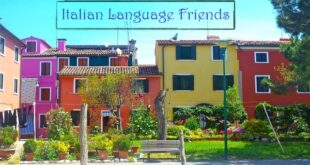The Italian Verb Avere
The Italian verb avere means to have and, given this definition, is an essential Italian verb to know. Avere serves an important function alone and also as an “assistant,” or auxiliary verb, for compound verbs (created from two or more verbs).
For now, we will focus on the present tense of avere. “I have, you have, he/she has,” will be used often when conversing in Italian, and all present tense forms of this verb should be memorized and readily available for use. Avere is an irregular verb in all present tense conjugations, except for the voi form; the voi form of avere follows the usual rules for -ere verbs.
The conjugation for avere is given in the table below. The irregular forms are brown and the regular voi form is green. The accented syllables are underlined. Say each verb below out loud and remember that in Italian the letter h is always silent!
Avere – to have
|
io |
ho | I have |
| tu | hai | you (familiar) have |
| Leilei/lui | ha | you (polite) have he/she has |
| noi | abbiamo | we have |
| voi | avete | you all have |
| loro | hanno |
they have |
Expressions that Use Avere
Many Italian expressions of emotion or physical sensation use avere as an integral part of the phrase. For the proper translation in English, we would use the verb “to be” in these phrases instead. For instance, when an Italian would say, “I have hunger,” this phrase is translated into English as, “I am hungry.” This is a good example of how we must learn to think in Italian if we want to speak in Italian!
A fully conjugated example of “to be hungry,” a common expression that uses avere, is given in the table below. The literal translation from Italian to English is in gray and the true English translation in black.
|
Avere fame – (to have hunger)/to be hungry |
|||
| io | ho fame | (I have hunger.) | I am hungry. |
| tu | hai fame | (You (familiar) have hunger.) | You (familiar) are hungry. |
| Lei
lei/lui |
ha fame | (You (polite) have hunger.)
(She/he has hunger.) |
You (polite) are hungry.
She/he is hungry. |
| noi | abbiamo fame | (We have hunger.) | We are hungry. |
| voi | avete fame | (You all have hunger.) | You all are hungry. |
| loro | hanno fame | (They have hunger.) | They are hungry. |
There is a long list of Italian expressions that use avere
but are translated into English with the verb “to be.”
A list of the most common Italian expressions that take avere in Italian but are translated with the verb “to be” in English follows.
Common Expressions that Use Avere
| avere fame | (to have hunger) | to be hungry |
| avere sete | (to have thirst) | to be thirsty |
| avere caldo | (to have warmth) | to be warm |
| avere freddo | (to have coldness) | to be cold |
| avere fretta | (to have hastiness) | to be in a hurry |
| avere sonno | (to have sleepiness) | to be sleepy |
| avere ragione | (to have righteousness) | to be right |
| avere vogia di | (to have the desire to) | to feel like |
| avere bisogno di | (to have need of) | to need |
| avere paura di | (to have fear of) | to be afraid |
Finally, when stating your age, use avere to describe how many years you have accumulated at the time of the question. Once again, the Italian equivalent of an English phrase that uses the verb “to be” uses the Italian verb “to have.” For instance, in English, we say, “I am 40 years old” but in Italian they say, “I have 42 years,” with, “Ho quarantadue anni.” This topic will be discussed more completely in our next blog. For now, just remember to say that you, or someone you know has… a certain number of years… with avere!
Of course, there are many situations in daily life when the expressions listed above will be a part of conversation! With practice — that is, with repetition of these phrases — it will become natural to use avere to the express the emotions and physical sensations listed above.
A few example sentences are given below, with the phrases that take avere underlined. Remember to leave out the Italian subject pronouns and start your sentence with the conjugated form of avere!
Ho freddo. È gennaio.
I am cold. It is January.
Hai fretta oggi? Resta per un po’ e avere un caffé con me!
Are you in a hurry today? Stay for a bit and have coffee with me!
La bambina ha sonno; deve andare a letto subito!
The baby is sleepy; she has to go to bed right away!
Abbiamo paura del buio.
We are afraid of the dark.
Avete voglia di andare al ristorante stasera?
Do you all feel like going to the restaurant tonight?
Le mamme hanno sempre ragione!
Mothers are always right!
The Italian Verb Essere
“To be, or not to be…” is one of the most famous lines ever written in the English language. But that phrase would not be possible without a verb to express the idea that we exist. Think of how many times a day we say, “I am” or “he is” or “we are” — all forms of the English infinitive verb “to be.”
In Italian, the verb essere means “to be.” Essere can be considered a “linking” verb, as it connects the subject in the beginning of the sentence with specific information about that same subject at the end of the sentence. No action is described, as with the action verb andare (to go) or even a general verb like abitare (to live). Instead, with the verb essere, the subject can be thought of as one and the same as, or “linked” to the information that follows. Given that this information is descriptive, essere is often used with adjectives.
Doesn’t it make sense, then that essere requires the ending for any adjective that follows to match the gender and number of the subject? They are, after all, one and the same!
Essere is also an essential “helping verb” in compound Italian verbs (which are made up of more than one verb). Hence essere is also be classified as an auxiliary, or “assisting” verb. For now, we will focus on the different forms of essere in the present tense. Essere is an irregular verb and all its forms need to be memorized — but they should be easy to remember given the daily use you will get out of them!
Essere – to be
| io | sono | I am |
| tu | sei | you (familiar) are |
| Lei lei/lui | è | you (polite)are she/he is |
| noi | siamo | we are |
| voi | siete | you all are |
| loro | sono | they are |
Choosing Essere or Avere
Essere, the Italian verb that means “to be,” is used in a similar way as in English — to describe an attribute of a person or thing and to state location. Remember that the Italian verb stare has taken over the meaning of “to be” when describe one’s health. (Additional expressions that use stare when English speakers would use “to be” are discussed in the blog, “How I feel… with ‘Stare.'” )
Essere is commonly used to link a subject with an adjective for descriptions
and therefore is used to state one’s name, occupation and other attributes.
For instance, during introductions, one can state, [Sono + name]. “Sono Caterina,” means, “I am Kathy.” This is an alternative to, “(io) Mi chiamo Caterina,” for “My name is Kathy.” (The subject pronoun “io” is usually left out of these statements and is given in parenthesis.)
Caterina can also use the verb essere to describe who she is by saying, “Sono italo-americana,” for “I am Italian-American,” and mention an important characteristic, such as that she is tall (alta). Remember that with essere the ending of that adjective must match the gender and number of the subject. Pietro would be italiano and alto. (If you need a refresher on feminine and masculine agreement for adjectives in Italian, visit our blog “How to Use Colorful Italian Adjectives.”
When stating your location, it is also necessary to use essere.
Remember that in this case the Italian preposition is important. A quick summary: the Italian preposition “in” is used before a country, region, or large island, and the Italian preposition “a” for a city or small island. For more detail, visit the blog “Italian Preposition ‘A’ or ‘In’?”
A summary list of examples:
(io) Sono Caterina. I am Kathy.
(io) Sono italo-americana. I am Italian-American. (feminine)
(io) Sono italo-americano. I am Italian-American. (masculine)
Lei è alta. She is tall.
Lui è alto. He is tall.
(io) Sono in Italia. I am in Italy.
(io) Sono a Roma. I am in Rome.
As already discussed in the previous section about avere, the verb that means “to have” is often used with nouns to indicate possession. In Italian, avere is also used to describe how a person is feeling — hungry, hot, cold, fearful, etc., while in English the verb “to be” is used instead.
Remember not to use essere
for these important phrases when speaking in Italian!
The Italian Preposition “di”
with Avere and Essere
In the previous section about avere, you may have noticed the use of the preposition di at the end of three of the phrases listed. The most common translation of “di” is “of,” but in many expressions the English translation will not strictly follow the Italian. Let’s go over these phrases again to demonstrate how to create Italian sentences with phrases that end in di for both avere and essere.
Avere is used describe a need for something that is often intangible. Take these three phrases, for instance: avere voglia di (to feel like), avere bisogno di (to need) and avere paura di (to be afraid of). A verb is commonly added after the preposition di in these situations to complete the sentence, with variable translation in English.
Some examples:
Ho bisogno di riposare.
I need to rest.
Ho paura di guidare una macchina grande.
I am afraid of driving a large car.
Ho voglia di mangiare una pizza.
I feel like eating a pizza.
Essere is also used in many daily expressions with the preposition di, but in this case to describe emotions. Again, in English, replacing the Italian preposition di with the translation of is variable. In some cases, the English infinitive verb will be used alone or the English expression may use a gerund instead of an infinitive verb. You must really learn to think in Italian to use these expressions!
Use of the preposition di with these expressions was discussed in the blog, “How to Use ‘Di’ in Italian.”
Below are several expressions of emotion that take essere, followed by some example sentences. How many more sentences can you think of using these phrases?
| essere certo di | to be certain of | Sono certo di… ricordare il tuo nome. |
| I am sure to remember your name. | ||
| essere sicuro di | to be certain of | Sono sicuro di… ricordare questo posto. |
| I am sure to remember this place. | ||
| essere contento di | to be happy to | Sono conteno di… stare qui. |
| I am happy to be here. | ||
| essere felice di | to be happy to | Sono felice di… incontrare mio cugino oggi. |
| I am happy to meet my cousin today. | ||
| essere fortunato di | to be lucky to | Sono fortunato di… mangiare questa cena con la mia famiglia stasera. |
| I am so lucky to be eating this dinner with my family tonight. |
||
| essere libero di | to be free to | Sono libero di… viaggiare. |
| I am free to travel. | ||
| essere stanco di | to be tired of | Sono stanco di… volare; la prossima volta prenderò il treno! |
| I am tired of flying; next time I will take the train! |
Remember how to use
the Italian verbs avere and essere
for every situation
and I guarantee you will use these verbs
like a native every day!
For “All the Italian you need to enjoy your trip to Italy,” click on the links below to purchase my Conversational Italian for Travelers books – and then listen to the audiobook “Just the Important Phrases” on your favorite streaming platform! —Kathryn Occhipinti


Conversational Italian for Travelers “Just the Important Phrases” pocket travel book with audio on your favorite streaming platform from Amazon.com and www.learntravelitalian.com

New! Practice short Italian phrases with this Audio Dialogue Practice Book. Download the audio from your favorite audio platform today! Check it out for free on Amazon.com
 Fra Noi Embrace Your Inner Italian
Fra Noi Embrace Your Inner Italian





